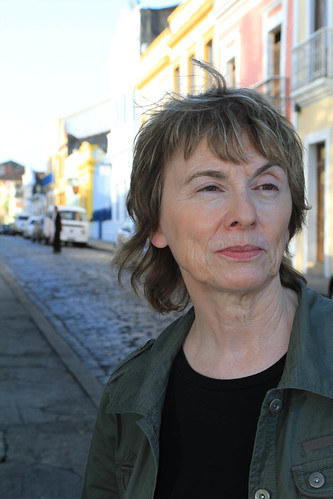The art world is in spiritual crisis—it has not had a new idea in years. So argues the cultural critic and feminist provocateur Camille Paglia in her new book,Glittering Images: A Journey Through Art From Egypt to Star Wars. The book—intended as a companion piece to her 2005 volume of poetry criticism, Break, Blow, Burn—is a slim survey of Western art in 29 essays, each focusing on a single work of art. The works include the idols of Cyclades (circa 3500–2300 B.C.), Bernini’s Chair of Saint Peter (circa 1647–53), Picasso’s Les Demoiselles d’Avignon (1907), and some surprises—like the Star Wars film Revenge of the Sith by George Lucas. The format of the book, Paglia explains in her introduction, is based on Catholic breviaries of devotional images, “like mass cards of the saints.” Recently I spent an afternoon with Paglia at the Philadelphia Museum of Art, where we spoke about her new book, religion, and the state of art and culture today.
For Paglia, the spiritual quest defines all great art—all art that lasts. But in our secular age, the liberal crusade against religion has also taken a toll on art. “Sneering at religion is juvenile, symptomatic of a stunted imagination,” Paglia writes. “Yet that cynical posture has become de rigueur in the art world—simply another reason for the shallow derivativeness of so much contemporary art, which has no big ideas left.” Historically the great art of the West has had religious themes, either explicit or implicit. “The Bible, the basis for so much great art, moves deeper than anything coming out of the culture today,” Paglia says. As a result of its spiritual bankruptcy, art is losing its prominence in our culture. “Art makes news today,” she writes, “only when a painting is stolen or auctioned at a record price.”
As a professor of liberal studies at the University of the Arts in Philadelphia, where she has spent her academic career teaching future artists, Paglia has seen this crisis of the art world unfold firsthand. Winding her way through the corridors of the Philadelphia museum, stopping occasionally to marvel at an ancient Roman bust or a medieval depiction of the Virgin and child, she tells me two stories.
In the late 1980s Paglia taught an introductory art-history course called Arts and Civilization to freshmen. When it came time to cover the Renaissance, Paglia decided to introduce her students to Michelangelo’s two-part panel from the Sistine Chapel ceiling,Temptation and Expulsion From the Garden. After Paglia’s lecture on this scene from the Book of Genesis, a student approached the professor. In Paglia’s telling, this student “cheerfully said that she was so happy to learn about that because she had always heard about Adam and Eve but never knew what they referred to!”
More recently, in the early 2000s, Paglia was teaching a course that she founded in the 1980s, Art of Song Lyrics, which was directed at musicians and included a spiritual called “Go Down, Moses.” But she said few recognized who Moses was or knew his story well. “If you are an artist and you don’t recognize the name of Moses,” she says, “then the West is dead. It’s over. It has committed suicide.”
More than 20 years ago, Paglia took another journey through art in her breakout book Sexual Personae: Art and Decadence from Nefertiti to Emily Dickinson. It launched her career as an irrepressible and politically incorrect cultural critic who was suddenly everywhere on the media circuit, speaking on topics ranging from Madonna and Elizabeth Taylor to date rape and educational reform. In the book, Paglia argued that Western culture has been a succession of shifting sexual personae (Mona Lisa is the original dominatrix; Dickinson was Amherst’s Madame de Sade). The book contained all the Paglia hallmarks: an infatuation with sex and beauty, strong prose, and an evisceration of feminism. Needless to say, Sexual Personae raised hackles and branded Paglia as theenfant terrible of academia and feminism.
That was then. While she is still more than willing to dig into what is left of the feminist movement—“feminism today is anti-intellectual” and “defined by paranoia,” she says—these days, she directs the venom of her sharp tongue to the dogmatic champions of secularism, liberals who narrow-mindedly dismiss religion and God. There is one, in particular, whom she cannot stand: the late Christopher Hitchens—like her, a libertarian-minded atheist. The key difference between the two is that he despised religion and God while Paglia respects both and thinks they are fundamental to Western culture and art. Paglia calls Hitchens “a sybaritic narcissist committed to no real ideas outside his personal advancement.”

Paglia’s problem with Hitchens reflects her larger concern about the state of art and culture. The arts world’s dismissal of religion, which came to a head in the 1980s and 1990s in the controversies over sacrilege, turned baiting Christianity into a litmus test of being avant-garde. “Nothing is more hackneyed than the liberal dogma that shock value confers automatic importance on an artwork,” she writes in her new book. In rushing to defend third-rate works like Andres Serrano’s Piss Christ (1987) and Chris Ofili’s The Holy Virgin Mary (1996), the art establishment backed itself into a partisan corner from which it has been unable to emerge. Thanks to this, many Americans consider the art world to be snobbish, effete, and debased. Paglia’s mission in Glittering Images is to change how ordinary Americans think of art. “Because of the spiritual hollowness of the art world, I wanted to show in my book that art is about the spiritual quest.” Paglia, the mother of a 10-year-old boy, is particularly concerned about the state of arts education among the youth. Few learn about art in their public schools, where religious themes are off-limits. “My aim,” she tells me, “was to write a slim book that would appeal to young people. I wanted to reach people who have never opened an art book in their lives.”
To that end she structures the book strategically: In the first part, she leads readers through a series of classic works of art—crowd pleasers—like theCharioteer of Delphi (circa 475 B.C.), Titian’s Venus With a Mirror (circa 1555), and Monet’s Irises (1900), hoping to gain the readers’ confidence. Then she introduces more difficult abstract and experimental works, like Jackson Pollock’s Green Silver (circa 1949), in an effort to show readers that these are equally beautiful and mystical. “These abstract artists are spiritual seekers,” she says. One of the highlights of Glittering Images is Paglia’s ability to capture the transcendental meaning of the more recent works, like Walter De Maria’s The Lightning Field (1977). Is that lightning bolt cutting through the sky the wrath of God, Paglia wonders, or a flash of divine and artistic revelation?
If the great artists are all spiritual seekers, then contemplating great art is, to Paglia, a religious experience. “This,” she tells me, referring to the museum with open arms, “is my church.” And Paglia is looking for converts. As she writes in Glittering Images, “A society that forgets art risks losing its soul.”



Niciun comentariu:
Trimiteți un comentariu